You are here
Monument to «Soyuz-11» spacecraft.
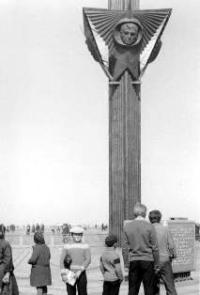
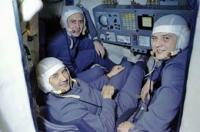
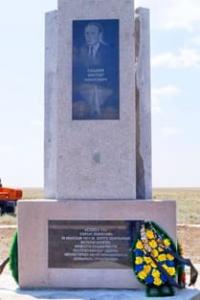
Monument to cosmonauts in Karaganda region
“Things don't always go smoothly,
Don't always come back on time
But the orbit will be fine
If there is a flame of courage"
Visit to monument to fallen cosmonauts in Karaganda region.
Monument to deceased cosmonauts from Soyuz-11 spacecraft is located at an altitude of 390.3 meters above sea level, 1.5 kilometers southeast of seasonal Koktas riverbed, 39.8 kilometers west of Shalginsky mine, 89.7 kilometers southwest of village of Karazhal, 188 kilometers southeast of city of Zhezkazgan, in Zhanaarka district of Karaganda region.
On June 30, 1971, the crew of the descent vehicle of the Soyuz-11 spacecraft - Georgy Dobrovolsky, Vladislav Volkov, Viktor Patsaev - was tragically killed during the landing. The cosmonauts died on their return to Earth due to the depressurization of the descent vehicle at high altitude.
The design of the ship, at that time, did not provide for space suits for the crew. According to archival photographs, the first memorial sign was erected by local residents at the end of 1973. A year later, in October 1974, a new monument appeared, depicted in the form of winged stars.
In 2008, the memorial was destroyed by vandals. In 2014, with the support of the Zhezkazgan edition - the mass regional newspaper Podrobnosti, a memorial plaque with the words “Zhezkazgan remembers” was erected at the site of the death of the cosmonauts.
And on July 7, 2016, next to the memorial plaque, an updated monument to the Three Heroes, who gave their lives for the sake of space exploration, was erected. The monument is three vertical marble slabs depicting three dead space heroes - Dobrovolsky, Volkov and Patsaev, who still stand shoulder to shoulder like a crew.
Early seventies. The battle of the superpowers for victories in space is in full swing. Having launched the first satellite, an astronaut and a woman, having gone out first into outer space, but having lost the championship in the "lunar landing" to the Americans, the Soviet Union plans to strengthen its positions.
The stake is made on the development of modular stations and the long-term finding of cosmonauts in orbit. On April 19, 1971, the world's first Salyut-1 station was launched into orbit. Already 4 days later, Soyuz-10 will start from Baikonur with cosmonauts Shatalov, Eliseev and Rukavishnikov on board.
However, due to problems with the docking station, the crew cannot go to the station, they are forced to return to the ground ... The next crew is assigned to complete the task. Experienced Alexei Leonov, together with Valery Kubasov and Petr Kolodin, are intensively preparing for the flight.
A huge number of medical checks, tests and analyzes ... And suddenly, 2 days before the start, already at Baikonur, Valery Kubasov x-ray showed darkening in the lungs. A difficult decision is made - to replace the entire crew with a backup one...
Later it turns out that Kubasov developed an allergic reaction to flowering plants. The commander of the backup crew Georgy Dobrovolsky, in the first seconds stunned by the decision of the commission, reports that his crew is ready for launch...
The launch, scheduled for June 6, 1971, is successful, and here is a new record - the first crew of the world's first orbital station! The cosmonauts who worked on board for 24 days set another record for staying in space, the crew fulfilled a busy schedule of scientific experiments and research, celebrated the birthday of Viktor Patsaev, who turned 38 years old, in orbit.
On June 30, 1971, the crew of the Soyuz-11 spacecraft was supposed to return to Earth. The longest space expedition at that time ended quite successfully. The crew took their places in the descent vehicle, the cosmonauts tied themselves with belts and began checking the spacecraft onboard systems. All parameters were normal.
At the estimated time, the descent vehicle entered the atmosphere. The antennas were burned, the voice communication was interrupted. This normal mode - radio exchange with the astronauts is restored when the parachute is deployed.
The parachute opened strictly according to the schedule at an altitude of about 7 kilometers, but "Yantari" - this is the call sign of Dobrovolsky, Volkov and Patsaev - were silent. At first, the silence on the air did not cause alarm. Radio antennas sewn into the parachute lines sometimes refused to land.
Helicopters flew to the landing site. Two minutes after landing, rescuers ran up to the descent vehicle. The capsule lay on its side, there was no external damage. They knocked on the wall - no one responded. The hatch was quickly opened.
All three were sitting in chairs with no signs of life. They were pulled out, and resuscitation attempts began, which lasted more than an hour. A special government commission investigating this incident came to the conclusion that the death of the cosmonauts occurred as a result of the depressurization of the descent vehicle and the subsequent suffocation.
One of the ventilation valves worked much earlier - at an altitude of about 120 km from the Earth. families of the deceased cosmonauts were sent from everywhere, a letter to the daughters of Georgy Dobrovolsky Marina and Natasha with words of sympathy and support was sent by US President Richard Nixon.
The ashes of the deceased cosmonauts were walled up in the Kremlin wall. The disaster was followed by a 27-month break in the launches of the Soyuz spacecraft. The next manned spacecraft Soyuz-12 was launched on September 27, 1973.
The ascent and descent operations began to be carried out only in spacesuits, the crew began to consist of two people. Partly the place of the third crew member was taken by the installation of autonomous life support for light spacesuits, in which a noticeable volume was occupied by cylinders with a supply of compressed oxygen.
Immediately after the incident, residents of the nearest village of Shalginsky erect a small memorial sign at the site of the tragedy, but already 2 years after the decree of the Council of Ministers of the USSR, a multi-meter stele with the wings and high reliefs of cosmonauts rises in the steppe.
In Soviet times, this monument was a place of pilgrimage, schoolchildren from Shalginsky came here on Cosmonautics Day, relatives of the deceased cosmonauts flew in. On the memorial plate were the words "The feat of the brave sons of the Soviet people, cosmonauts G. Dobrovolsky, V. Volkov, V. Patsaev, committed in the name of the triumph of science, for the good of all mankind, will forever remain in the grateful memory of people all over the planet."
Geographic coordinates of monument to Soyuz-11 spacecraft: N47 ° 21'23 E70 ° 07'16
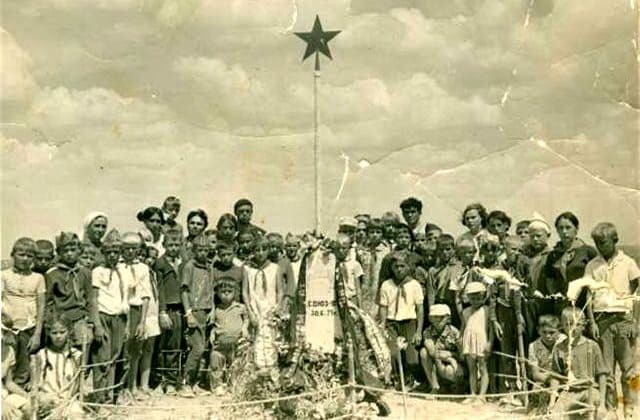
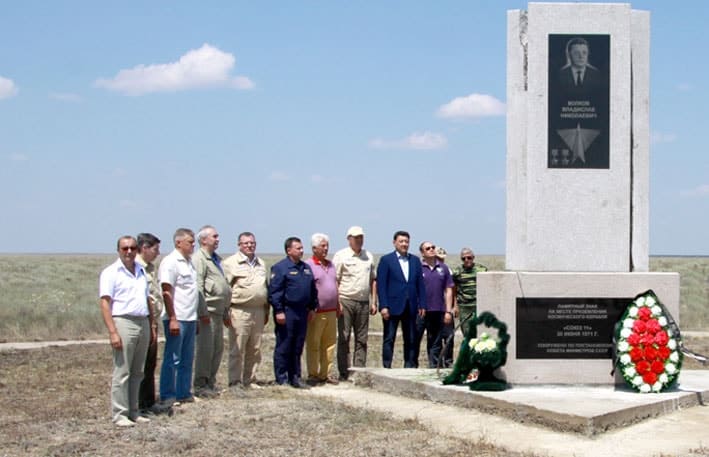
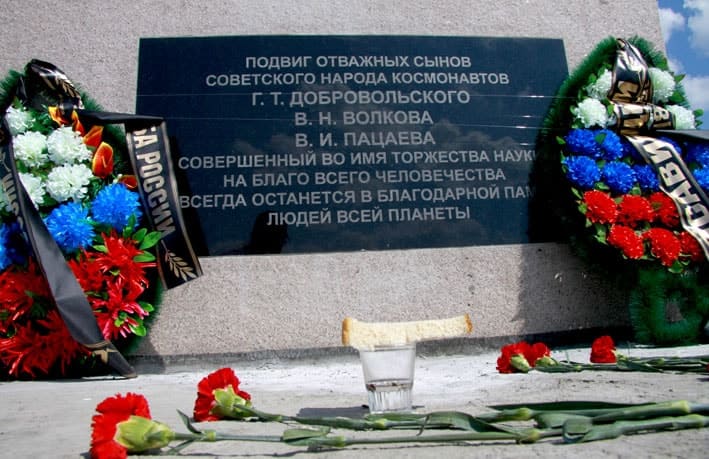
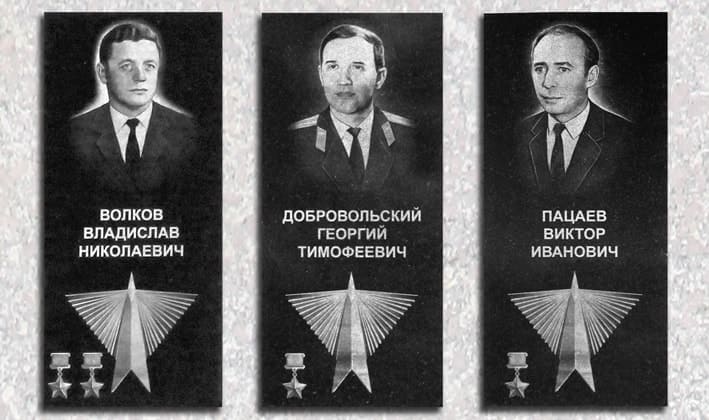
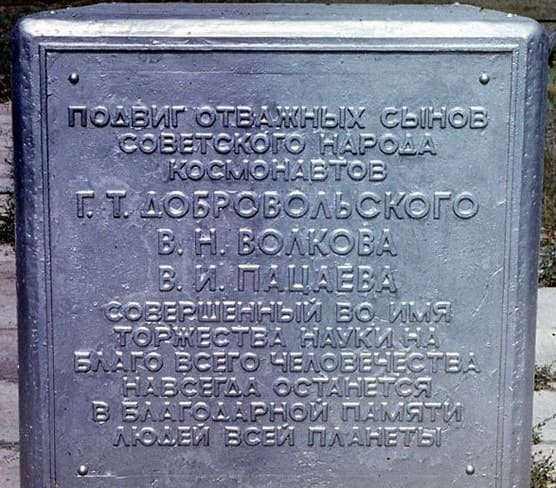
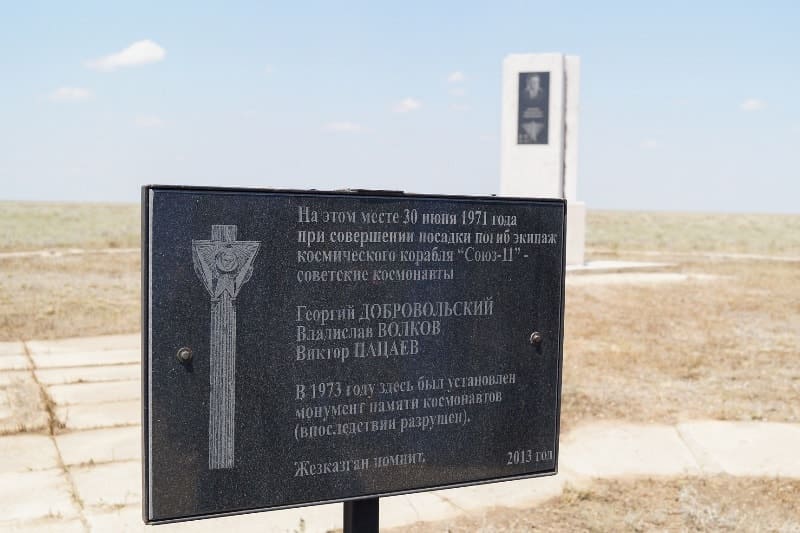
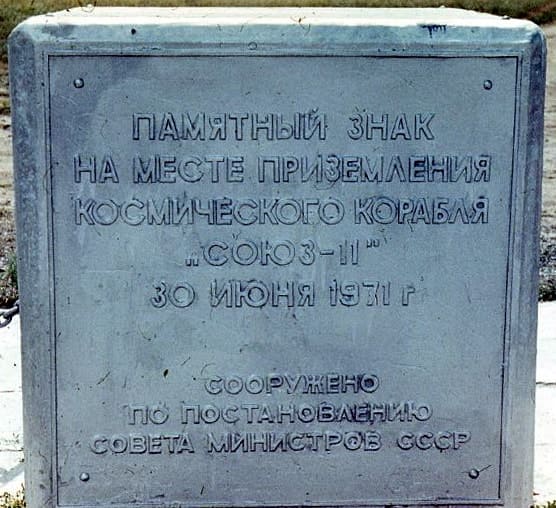
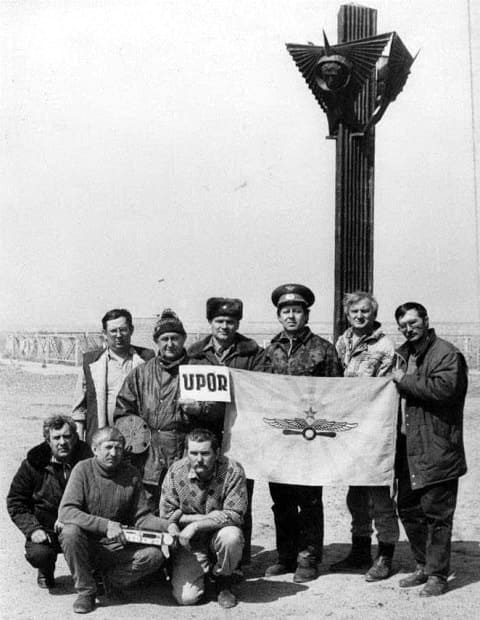
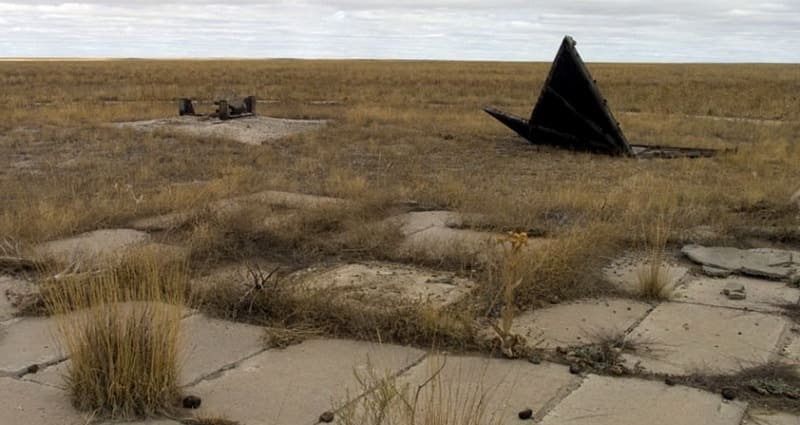
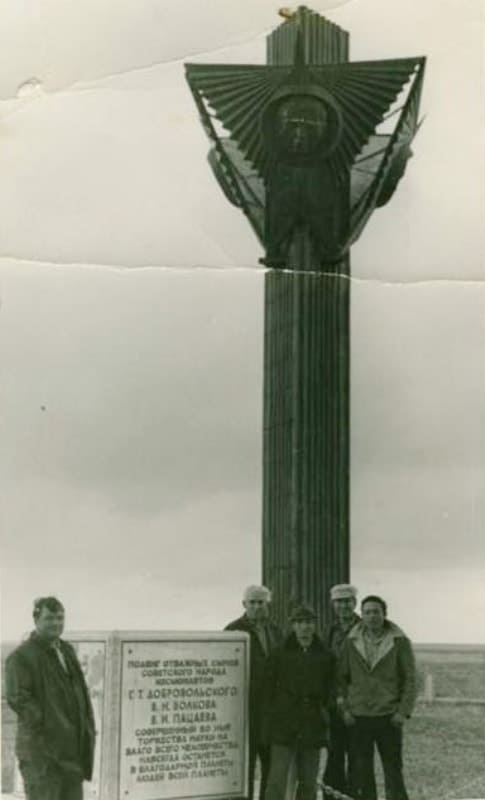
Authority:
Alexey Loginovskikh, Julia Vysotskaya. http://podrobnosty.kz/rubriki/zemlyaki/640-memorial-pogibshego-45-let-nazad-ekipazha-soyuz-11-vosstanovlen-v-zhezkazganskoj-stepi.html
http://niskgd.ru/mix/p17/memorial/
www.gctc.ru
Photos by:
Alexei Loginovskikh.







